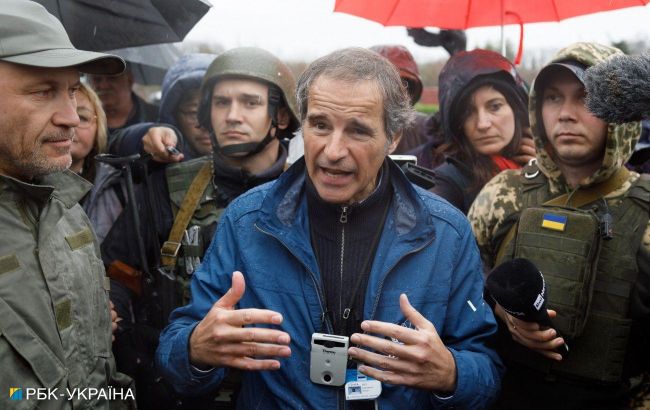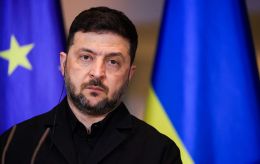Massive Russian strike cuts power output at three Ukraine NPPs - IAEA
 Photo: Rafael Grossi, IAEA Director General (Vitalii Nosach, RBC-Ukraine)
Photo: Rafael Grossi, IAEA Director General (Vitalii Nosach, RBC-Ukraine)
Following a massive overnight combined attack by Russian forces on November 28, three Ukrainian nuclear power plants (NPPs) reduced their electricity output in the morning. The affected facilities include the Khmelnytskyi, Rivne, and South Ukraine NPPs, according to Rafael Mariano Grossi, Director General of the International Atomic Energy Agency (IAEA).
The IAEA noted that the new Russian strikes on Ukraine's energy infrastructure have further endangered nuclear safety amid the ongoing war.
Grossi said that for the second time in less than two weeks, the Khmelnytskyi, Rivne, and South Ukraine NPPs scaled down their output as a precautionary measure during a massive Russian assault involving missiles and drones.
Simultaneously, air raid sirens were triggered at all three facilities, Grossi added.
Additionally, two IAEA teams in Ukraine were forced to seek shelter during the air attacks, he reported.
Reactor power reduction and nuclear safety risks
The IAEA stated that all nine operational reactors at Ukrainian NPPs reduced their output. Furthermore, one reactor at the Rivne NPP was disconnected from the grid. Despite these developments, the NPPs continued to receive external power, even as the Khmelnytskyi site lost connection to two of its power transmission lines.
"Ukraine’s energy infrastructure is extremely fragile and vulnerable, putting nuclear safety at great risk. Once again, I call for maximum military restraint in areas with major nuclear energy facilities and other sites on which they depend," Grossi emphasized.
Impact of Russian attacks on substations
While no direct damage to NPPs was reported during the November 28 assault, Ukrainian authorities informed the IAEA that the strikes once again affected substations used by the NPPs to transmit and receive electricity off-site.
The IAEA deems these substations critical for nuclear safety. According to the agency, they were damaged in earlier attacks, including in August.
In September and October, IAEA teams visited seven substations across Ukraine to assess the aftermath of earlier Russian strikes. They reported severe damage to the infrastructure.
Last week, Grossi said IAEA experts concluded that the network’s ability to ensure reliable off-site power supply to NPPs had been significantly weakened.
"The IAEA will continue to assess the extent of damage to facilities and power lines that are essential for nuclear safety and security. The IAEA will continue to do everything in its power to reduce the risk of a nuclear incident during this tragic war," Grossi stated on November 28.
"The fragility of Ukraine’s power grid"
NPPs require a stable connection to the grid to distribute the electricity they generate and receive external power to cool reactors.
The IAEA highlighted that the increasing "fragility of the power grid" has been one of the main nuclear safety challenges throughout the conflict.
"The Director General has repeatedly underlined the importance of adhering to the seven indispensable pillars of nuclear safety and security, one of which states that there must be a secure off-site power supply from the grid for all nuclear sites," the agency added.
Russia’s November 28 massive strike on Ukraine
Russian forces launched a combined attack on Ukraine overnight and into the morning of November 28, firing a total of 188 missiles and drones. The strikes targeted energy infrastructure across the country.
Ukraine’s Air Force reported that air defense systems intercepted 76 cruise missiles and 35 drones.
The attacks caused power supply disruptions in several regions of Ukraine. Read more about the aftermath of the enemy shelling in our separate article.
Energy expert Volodymyr Omelchenko, Director of Energy Programs at the Razumkov Center, commented to RBC-Ukraine that the massive shelling was an attempt by Russian forces to disconnect Ukraine’s nuclear power plants from the national grid. However, he said the effort was only partially successful.
In September, Ukraine’s Ministry of Energy warned of potential Russian strikes on nuclear facilities, cautioning that an attack on NPP substations would put the entire European continent at risk of a radiation hazard.

